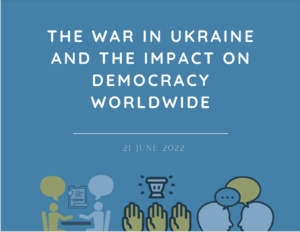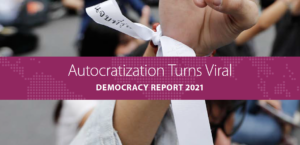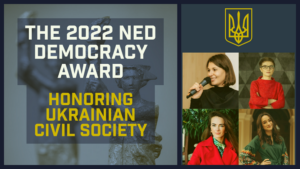As Ukraine defends its right to self-determination and freedom, it has become a symbol of the fight between democracy and dictatorship and has renewed the importance of democracy as a foreign policy priority, a major conference hosted by the European Partnership for Democracy heard today.
 A recent survey conducted by the European Council on Foreign Relations found that in nearly every European country surveyed, more citizens want a quick end to the war, even at the cost of territorial concessions, than want to punish Russia for its aggression and restore Ukraine’s territorial integrity, notes Brookings analyst William Galston, a former board member of the National Endowment for Democracy (NED).
A recent survey conducted by the European Council on Foreign Relations found that in nearly every European country surveyed, more citizens want a quick end to the war, even at the cost of territorial concessions, than want to punish Russia for its aggression and restore Ukraine’s territorial integrity, notes Brookings analyst William Galston, a former board member of the National Endowment for Democracy (NED).
As the fighting drags on, it becomes more likely that European publics will rebel against soaring energy costs and the economic slowdown the conflict has caused. If the war turns into a protracted conflict of political will, Vladimir Putin could prevail, despite the best efforts of the Biden administration, he cautions in The Wall Street Journal.
Our big mistake after 1989 was to forget about the contingent or ethical part of democracy, says Yale historian Timothy Snyder. Because after 1989, after the end of communism in Eastern Europe, we jumped on the determinist ship. We decided that larger historical forces were going to bring democracy about.
 What the Ukrainians are doing is a very compressed example of the kind of courage that you actually need to keep a democracy going, he tells Vox’s Sean Illing.
What the Ukrainians are doing is a very compressed example of the kind of courage that you actually need to keep a democracy going, he tells Vox’s Sean Illing.
The Nobel Peace Prize that Russian journalist Dmitry Muratov was auctioning off to raise money for Ukrainian child refugees sold Monday night for $103.5 million, shattering the old record for a Nobel, POLITICO reports. Muratov, editor of the independent Russian newspaper Novaya Gazeta who has criticized the Kremlin’s war on Ukraine, said the auction results exceeded his expectations, The Post adds.
Russia’s invasion has the potential to reshape democracy support policies, changing practices of defending and extending democratic values and of interactions with autocratic states, according to a new analysis from the EPD and Carnegie. Autocrats around the world are watching and will draw comfort, even inspiration, from any signs of accommodation, the authors suggest:
Democracy defenders, rights activists, and other civil society actors are equally watching and hoping they will not lose their sources of inspiration and support. The West’s credibility is at stake. This is not, and never was, a choice between a values- and an interest-based policy; values are democracies’ most fundamental interest.
While international attention remains focused on immediate operational events in Russia’s invasion of Ukraine, the crisis also raises questions about longer-term trends, note Richard Youngs and Ken Godfrey:
Will the invasion prompt democratic powers to strengthen their commitments to defend and extend democratic values? Could it have the opposite effect, as geopolitical calculations take center stage? What lessons do decisionmakers need to take on board with regard to the strategies that democracy-support organizations deploy? And what does the war mean for nondemocratic states?
We are glad to invite you to EPD’s conference “What Now for Democracy”. Check out the programme here: https://t.co/LpvNR5RTuO pic.twitter.com/f4v9l5SrOP
— EPD – European Partnership for Democracy (@EPDeu) June 8, 2022
There are opportunities for international democracy promotion, but getting it right will not be easy. Democracy promotion has lost credibility and priority over the past decade, say Julia Leininger and Staffan I. Linberg. Reviving it requires a strategic turnaround that focuses on protecting against autocratization.
 The question democracy promoters must ask is no longer simply “How do we support democratization?”, they add, but “How can we foster resilient democracies and protect shaky ones from autocratization?”
The question democracy promoters must ask is no longer simply “How do we support democratization?”, they add, but “How can we foster resilient democracies and protect shaky ones from autocratization?”
The new context makes the European Commission ‘s Team Europe Democracy (TED) initiative even more important in many ways, says Victoria Perotti, an independent senior expert. As European donors redirect funds in the short term to cover humanitarian needs related to the invasion, they will need to ensure maximum impact from each euro they spend on democracy support. The crisis in Ukraine is evidence of the dangers of authoritarianism to international peace and security. As such, fighting authoritarianism by increasing democracy-support efforts should be a strategic priority.
So, what should the West do differently? asks Anthony Smith the chief executive of the Westminster Foundation for Democracy:
- First, define the challenge clearly. The fight for democracy is a campaign, not a war. It involves shifting norms and behaviors in whole societies. Western governments need to be persuasive, patient, and persistent by supporting local reformers while shifting the international dial on democratic standards. They will also need to be strategic, as competitors have been active where the West has pulled back; and while every country is important, change in some will shift a whole region.
- Second, a long-term campaign means that democracy supporters must be honest about trade-offs and smart about redlines. …. governments can use democracy impact audits to consider the effects that actions have on democratic governance and find win-win approaches. For example, it is possible to build the need for legislative oversight into international health programs and integrate the need for a civil society voice into negotiations on trade agreements. In other words, Western governments can do development democratically.
- Third, democracy supporters can work directly with institutions that create resilient democracies: parliaments, political parties, free media, judicial systems, and civil society. That work involves personal engagement, because strengthening democracy requires not only technical fixes but also a democratic culture….
 The many abstentions in the votes on the UN General Assembly resolutions on Ukraine adopted in March and April 2022 should serve as a warning: with a few shining exceptions, democracy did not resonate strongly, even among its self-declared leaders in the Global South, like India and South Africa, adds Christian Leffler, a former deputy secretary general of the European External Action Service:
The many abstentions in the votes on the UN General Assembly resolutions on Ukraine adopted in March and April 2022 should serve as a warning: with a few shining exceptions, democracy did not resonate strongly, even among its self-declared leaders in the Global South, like India and South Africa, adds Christian Leffler, a former deputy secretary general of the European External Action Service:
- The defense of democratic principles is important but must be backed up by vigorous—and generous—support for democratic institutions and practice around the world. This is a time to redouble cooperation on governance, not to let it slip in the face of realpolitik. The EU’s Team Europe Democracy initiative is promising in this respect, as it allows for increased backing for those who seek to strengthen governance and stand up for democracy. Conversely, those who flout democratic principles and ignore UN calls for action should not be surprised to see the EU reduce its engagement or redirect it to civil society and other actors.
 The second major challenge that is already visible is the temptation to address constraints, for example on energy supplies, with short-term fixes with awkward partners. … Autocrats around the world are watching and will draw comfort, even inspiration, from any signs of accommodation. Democracy defenders, rights activists, and other civil society actors are equally watching and hoping they will not lose their sources of inspiration and support. The West’s credibility is at stake. This is not, and never was, a choice between a values- and an interest-based policy; values are democracies’ most fundamental interest.
The second major challenge that is already visible is the temptation to address constraints, for example on energy supplies, with short-term fixes with awkward partners. … Autocrats around the world are watching and will draw comfort, even inspiration, from any signs of accommodation. Democracy defenders, rights activists, and other civil society actors are equally watching and hoping they will not lose their sources of inspiration and support. The West’s credibility is at stake. This is not, and never was, a choice between a values- and an interest-based policy; values are democracies’ most fundamental interest.
Democratic realists would say: Sure, we need to deter Russia, but this is the twenty-first century and we cannot just repeat the Cold War, argues Michael Meyer-Resende, the executive director of Democracy Reporting International. Democracy and human rights are not nice-to-haves; they are part of global security. They are as much hard-power issues as is the number of missiles a government has. Countries that slide into dictatorship are a present danger for all.
Will the invasion of Ukraine work for or against international democracy? @KenLCG and I assembled a team of experts to reflect on this crucial question: @Ju_Lein @StaffanILindber @adr_smith @meyer_resende @Fromagehomme https://t.co/bB6IzRot82
— Richard Youngs (@YoungsRichard) June 15, 2022







